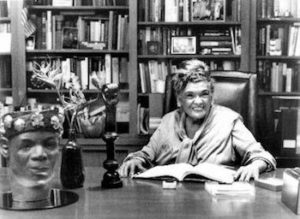
Zelma Watson George
Zelma Watson George was born on this date in 1903. She was a Black activist, a delegate to the U.N., and an opera singer, speaker, and educator.
She was born in Hearn, Texas, the daughter of Samuel and Lena Thomas. Her father was a Baptist minister. Her family lived in Hearne, Palestine, and Dallas and briefly in Hot Springs, Arkansas, during her childhood. She later remembered the presence of several prominent Black leaders who spoke at her father's church and visited their home in Dallas. W.E.B. DuBois, Booker T. Washington, Carter Woodson, Mary Church Terrell, and Walter White were some notable visitors. They frequently discussed issues relating to African Americans in her presence.
Her family left Dallas when her father incurred the wrath of some white Dallas citizens for his assistance to Black prisoners. The family was threatened by Dallas authorities and the Ku Klux Klan and moved to Topeka, Kansas, where her father accepted another pastorate in 1917. After graduating from the Topeka public schools, she enrolled at the University of Chicago. Because the university would not permit her to reside in the dormitory with white women, her father accepted a pastorate in Chicago, and she lived with her family while attending college.
She obtained a degree in sociology from the University of Chicago and studied voice at the American Conservatory of Music. She earned advanced degrees from New York University in Personnel Administration and Sociology. George served as a social worker for the Associated Charities of Evanston, IL, and was a probation officer for the juvenile court of Chicago. From 1932 to 1937, she was dean of women and director of personnel administration at Tennessee State University in Nashville.
She moved in 1937 to Los Angeles, where she established and directed the Avalon Community Center until 1942. With the assistance of a grant from the Rockefeller Foundation, she then moved to Cleveland, where she researched her dissertation and began a lengthy career of civic involvement through membership in such organizations as the Young Women's Christian Association, the Council of Church Women, the Girl Scouts, the Conference of Christians and Jews, the League of Women Voters, the Fund for Negro Students, the Urban League, and the National Association for the Advancement of Colored People (NAACP).
She also acted in Menotti's "The Consul" at the Cleveland Playhouse and performed the role of Mrs. Peachum in Kurt Weill's "The Three Penny Opera" at the Karamu. Her first marriage ended in divorce, and she married for the second time to attorney Clayborne George in 1944. She had no children.
Beginning in 1949, George performed in several stage presentations. She played and sang the lead role in Gian-Carlo Menotti's "The Medium," an opera that ran for 67 nights at the Karamu Theater in Cleveland and for 13 weeks in New York City at the Edison Theater. After "The Medium" closed on Broadway, George received the Merit Award from the National Association of Negro Musicians.
During the 1950s, she became involved with national and international political issues as an adviser to President Dwight Eisenhower's administration. She toured with the Defense Advisory Committee on Women in the Armed Services from 1954 to 1957 and served in 1958 on the president's committee to plan the White House Conference on Children and Youth. She was on the executive council of the American Society for African Culture from 1959 to 1971, traveled to Europe and Asia through the Educational Exchange Program, and served as a member of the United States delegation to the United Nations in 1960.
In the 1960s, she served as a speaker for the W. Colston Leigh Lecture Bureau, the Danforth Foundation, and the American Association of Colleges, usually addressing secondary schools, universities, civic clubs, and corporate employees.
George attended a "Ban the Bomb" conference in Ghana, West Africa, in 1963 and the First World Festival of Negro Art with Marion Anderson and Duke Ellington in Senegal in 1966. Also, in 1966, she became executive director of the Cleveland Job Corps Center for Women. She delivered the keynote address for the first Student International Security Council Meeting in 1969. President Richard Nixon named her to the Corporation for Public Broadcasting, where she worked from 1971-72. On a return home from lecturing at Bethune-Cookman College, she stopped in Orlando to visit relatives.
During a delay at their airport, she took a seat in a waiting room and was approached by a police officer to leave the room: "Get out, you Yankee trouble-maker, or I'll throw you out!" She responded angrily to the room of 75 people: "I am a United States delegate to the United Nations. Not long ago, I returned from a round-the-world lecture tour at the request of the State Department. I was trying to create for people in foreign lands an image of my country as a land where all men are created equal, and freedom is everyone's birthright. Is there no one in this room who will stand up for me now?" No one spoke up for her.
From 1966-74, she was the director of the Cleveland Job Corps, which experienced tremendous growth. Even in her retirement and after the death of her husband, she lectured, wrote, and taught at Cuyahoga Community College in the Elders Program. Her classes were extremely popular due to her experience, knowledge, and passion. She received the Dag Hammarskjold Award and the Edwin T. Dahlberg Peace Award. She was selected by the Greater Cleveland Women's History Committee as one of the "Women Who Shaped Cleveland." The Civic Recognition Committee of Ohio awarded her the Daughter of Ohio award for Statewide Honors.
Zelma George died on July 3, 1994, in Cleveland, Ohio. Today, a shelter for homeless women and children is named in her honor.
Cleveland Job Corps Center Committee,
Alpha Omega Chapter,
Alpha Kappa Alpha Sorority.
Here's Zelma, 1971.
The Texas State Historical Association
